大学英语B级模拟测试试题第套
b级大学英语模拟试题及答案

b级大学英语模拟试题及答案一、听力理解(共20分)1. What does the woman think of the new restaurant?A) It's too crowded.B) It's a bit expensive.C) It's very popular.D) It's not very clean.2. Why is the man going to the library?A) To borrow a book.B) To return a book.C) To study for an exam.D) To meet a friend.3. What is the weather like today?A) Sunny.B) Rainy.C) Cloudy.D) Windy.4. What time does the train leave?A) At 7:00 am.B) At 8:00 am.C) At 9:00 am.D) At 10:00 am.5. What does the man suggest doing?A) Going to the movies.B) Going for a walk.C) Cooking dinner at home.D) Ordering takeout.二、阅读理解(共30分)Passage 1The rise of digital technology has revolutionized the way we communicate, work, and live. With the advent of smartphones, tablets, and laptops, we have access to a wealth of information at our fingertips. However, this convenience comes at a cost. The constant connectivity has led to a decrease in face-to-face interactions and an increase in screen time, which can have negative effects on mental health and social skills.6. What is the main topic of the passage?A) The benefits of digital technology.B) The impact of digital technology on communication.C) The drawbacks of digital technology.D) The history of digital technology.7. What is one negative effect of constant connectivity mentioned in the passage?A) Increased face-to-face interactions.B) Improved mental health.C) Decreased social skills.D) Increased screen time.Passage 2In recent years, there has been a growing interest in sustainable living. People are becoming more aware of theenvironmental impact of their daily activities and areseeking ways to reduce their carbon footprint. This shift in mindset has led to the popularity of eco-friendly productsand services, as well as a rise in community initiativesaimed at promoting a greener lifestyle.8. What is the main focus of the passage?A) The decline in interest in sustainable living.B) The environmental impact of daily activities.C) The popularity of eco-friendly products.D) The rise in community initiatives for a greener lifestyle.9. What is one way people are reducing their carbon footprint?A) By using more eco-friendly products.B) By increasing their daily activities.C) By ignoring community initiatives.D) By promoting a non-green lifestyle.三、完形填空(共20分)In today's fast-paced world, it is crucial to stay organized and efficient. One way to achieve this is by using a daily planner. A daily planner can help you 10) _______ your time and ensure that you are using it wisely. It can also help you prioritize tasks and 11) _______ your goals.10. A) wasteB) manageC) forgetD) lose11. A) ignoreB) achieveC) postponeD) abandon四、翻译(共15分)12. 随着科技的发展,我们的生活变得越来越方便。
最新高校英语应用能力考试B级模拟题及答案
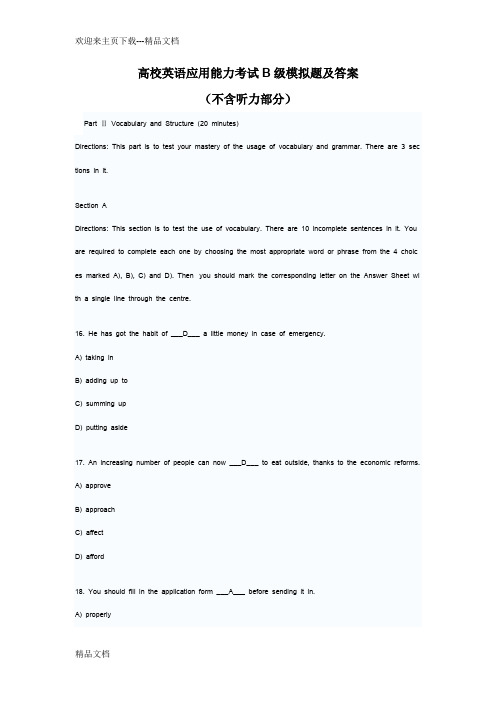
高校英语应用能力考试B级模拟题及答案(不含听力部分)Part ⅡVocabulary and Structure (20 minutes)Directions: This part is to test your mastery of the usage of vocabulary and grammar. There are 3 sec tions in it.Section ADirections: This section is to test the use of vocabulary. There are 10 incomplete sentences in it. You are required to complete each one by choosing the most appropriate word or phrase from the 4 choic es marked A), B), C) and D). Then you should mark the corresponding letter on the Answer Sheet wi th a single line through the centre.16. He has got the habit of ___D___ a little money in case of emergency.A) taking inB) adding up toC) summing upD) putting aside17. An increasing number of people can now ___D___ to eat outside, thanks to the economic reforms.A) approveB) approachC) affectD) afford18. You should fill in the application form ___A___ before sending it in.A) properlyC) regularlyD) simply19. The American and the British not only speak the same language but also ___C___ a large numbe r of social customs.A) representB) preserveC) shareD) bear20. When Rabbit was driving down to the office he __C____ Eathorn's car.A) overturnedB) overlookedC) overtookD) overthrew21. The foreign minister ___C___ his country at the conference.A) presentedB) replacedC) representedD) stood22. __B____ how effective the original layout (安排) is, changes are sure to happen.A) Except forB) Regardless ofD) According to23. In Britain the father is more involved with ___B___ children, often because the mothergoes out to work.A) bringing outB) bringing upC) bringing forthD) bringing about24. Neil __B____ that he broke the window, but I'm sure he did.A) definesB) deniesC) dependsD) relies25. The town lacks _C_____ facilities such as a swimming pool or a bowling alley.A) pleasureB) measureC) leisureD) treasureSection BDirections: This section is to test the use of grammar. There are 10 incomplete sentences in it. You s hould fill in each blank with the proper form of the word given in the brackets. Write the word or wod s in the corresponding spaceon the Answer Sheet.36. A series of cultural programmes (hold) ____ have been held________ in Shanghai to celebrate this largest national sports meeting in history.37. It's much (easy) _____ easier_______ to talk about your problems than it is to solve them.38. When the courses (complete) ______ have been completed______. the trainers are tested to find out what they have learned.39. The soldier's (brave) ____ bravery ________ was fully demonstrated when he jumped into the icy water to save the drowning child.40. We find it hard to stand him any longer; he behaves so (change) _____ changeably _______.41. (believe) _____ Unbelievably _______, the little boy can speak three foreign languages.42. As people are excited about new space technology, they enjoy (see) ______ seeing______ movies about adventures in space.43. Unless he (tell) _____ tells_______ us who he is, we won't let him in.44. Could you help me to understand what it is about her (complain) ______ complaints______ that upset you?45. I'd like to go with you, but with so much work to do today I'm (able)_____ unable_______ to.Part ⅢReading Comprehension (40 minutes)Directions: This part is to test your reading ability. There are some tasks for you to fulfill. You should read the given materials carefully and do the tasks as you are instructed.Task 1Directions: After reading the following passage, you will find 5 questions or unfinished statements, num bered 46 through 50. For each question or statement there are 4 choices marked A), B), C) or D). Y ou should make the correct choice and mark the corresponding letter in the Answer Sheet with a singl e line through the centre.We use both words and gestures to express our feelings, but the problem is that these words and gestures(手势)can be understood in different ways.It is true that a smile means the same thing in any language. So does laughter orcrying. Fear is another emotion that is shown in much the same way all over the world. In Chinese a nd in English literature, a phrase like 'he went pale and began to tremble suggests that the man is ei ther very afraid or he has just got a very big shock. However, 'he opened his eyes wide' is used to s uggest anger in Chinese whereas in English it meanssurprise. In Chinese surprise can be described in a phrase like 'they stretched out their tongues!' Sticki ng out your tongue in English is an insulting(侮辱)gesture or expresses strong dislike.Even in the s ame culture, people differ in their ability to understand and express feelings. Experiments in America h ave shown that women are usually better than men at recognizing fear, anger, love and happiness on people' faces. Other studies show that older people usually find it easier to recognize or understand b ody language than younger people do.46. Which of the following is TRUE according to the passage?AA) It is difficult to tell what people's words or gestures really mean.B) Gestures can be understood by most people but words can not.C) Words can be better understood by older people.D) We can easily understand what people's gestures mean.47. People's facial expressions may be misunderstood because _____C_______.A) people of different sexes may understand a gesture differentlyB) people speaking different languages have different facial expressionsC) people from different cultures use different facial expressionsD) people of different ages may have different interpretations48. In the same culture, people _____D_______.A) hardly fail to understand each other's ideas and feelingsB) are equally intelligent even if they have different backgroundsC) almost have the same understanding of the same thingD) may have different abilities to understand and express feelings49. From the passage, we can conclude that ____A________.A) words and gestures can both be used to express feelingsB) gestures are more effectively used than wordsC) words are often more difficult to understand than gesturesD) words are used as frequently as gestures50. The best title for this passage can be _______B_____.A) Gestures and FeelingsB) Words, Gestures and FeelingsC) Words and FeelingsD) Culture and UnderstandingTask 2Directions: This task is the same as task 1. The 5 questions or unfinished statements are numbered 51 through 55.When the early settlers, especially the English, arrived in the New World, the hardships, and dangers awaiting them were totally unexpected. Had it not been for some friendly Indians, the colonists never would have survived the terrible winters. They knew nothing about planting crops, hunting animals, buil ding solid houses, or making clothing from animal skins. Life in England had been much simpler, and t his new life was not like what the Spanish explorers had reported.The settlers did introduce iron tools, muskets(步枪) for hunting , domesticated animals, and political way to the Indians. In exchange, the s ettlers learned to build canoes(独木舟) for water transportation and snowshoes for winter traveling. The Indians also taught them to penetrate through the forest, to hunt large animals and trap smaller ones, and to catch fish in the lakes and streams.The natives also introduced to the settlers typical loc al food. Everything possible was done in order to make their new settlement resemble the homes they had left behind.51. Which of the following did the new settlers teach the Indians?DA) New means of water travel .B) How to trap animals.C) New methods of fishing .D) New political ways.52. What can we learn about some local foods in the new land from the passage?BA) They were preferred to eat raw.B) They were soon exported to England by the settlers.C) They were the main foods for Indians.D) They were also common in England.53. The Indians mainly taught the settlers to _____A_______.A) survive on the new landB) change their former habitsC) cooperate with themD) live a better life54. Which of the following is TRUE according to the passage?CA) The settlers had difficulty making friends with the Indians.B) The settlers soon became accustomed to the new world.C) The settlers evidently found the winters severe.D) The settlers were well prepared to encounter hardships.55. From the last sentence of the passage we can learn that _____B_______.A) the settlers hated to live in the new landB) the settlers had a deep love for their old homesC) the settlers would like to forget their old lifeD) the settlers made every effort to improve their new lifeTask 3Directions: After reading the following passage, you will find 5 questions (No. 56 through No. 60) to it. You should give brief answers to these questions. The answers should be no more than 8 words. Wr ite them in the corresponding space on the Answer Sheet.Investment is a key way for business to grow and for investors to make money. Numerous studies ha ve shown that, on average, high-risk investors make more than low-risk ones. Over time the stock mar ket rewards them for taking a risk, sometimes makes them suffer from heavy losses. Even during the 1980s, the decade of the stock market crash, one study shows that over the whole of the ten years s hares profited higher than lower-risk fixed interest and property investments.This brings us to the first b asic rule relating to risk: high risk equals high return. If you want to maximise your savings, take some risk with at least some of your money.Keep in mind, though, the second rule relating to risk: diversity, or spread your eggs around lots of baskets. This is partly so you won't be hurt too badly if one com pany fails.Research also shows that you won't be rewarded with high returns for the all-eggs-in-one-ba sket type of risk. In short, you're mad not to spread your money around.56. What is the possible title of this passage?__________________. Investments______________________________________________57. What disadvantage may high-risk investors have?High-risk investors may_________________ suffer from heavier losses________________________ than low-risk ones.58. What is the first basic principle about risk?_______________________ High risk equals high return__________________________________________59. Which word has a meaning close to "spreading your money around'?_________________________ Diversity________________________________________60. What does the author think is the best way of making investment?_____________________ Spread your money around____________________________________________Task 4Directions: After reading the following passage, you are required to complete the outline below it (No.61 through No. 65). You should write your answers briefly on the Answer Sheet correspondingly.Antarctica is for the most part a vast, icy emptiness, some 14 million square kilometres of which is al most completely covered by an ice sheet with an average thickness of over 2,000 meters.Only about 2% of the land mass is ice-free, and about half of this is in the Ross Dependency comprised of land, ice-shelf and islands between 160 degrees east and 150degrees west.The largest single ice-free area lies in South Victoria Land, about 100 kilometres from Ne w Zealand's scientific research station, Scott Base on Ross Island.The United States also has a large base at the South Pole, known as the Amundsen-Scott Base and named after two of the most importa nt early 20th century explorers who helpedbring world attention to the continent.Only a very small proportion of the coast is easily accessible, mo stly along the coast of Victoria Land and Ross Island.61.___________________________________62.___________________________________63.___________________________________64.___________________________________65.___________________________________61. The average thickness of the ice sheet62. 2% of the land mass63. Between 160 degrees east and 150 degrees west64. Amundsen and Scott65. Along the coast of Victoria and Ross IslandTask 5Directions: Here you will find 6 sentences (marked A, B, C, D, E and F) and an incomplete short pas sage following them. Read them carefully and insert (插入) 5 of the sentences into the passage so th at it will become a meaningfulcomplete one. One sentence will have to the dropped. Write the letter to the selected sentence in the corresponding brackets on the Answer Sheet.A: During the first months, I was immersed(沉浸)in happiness and curiosity.B: My mind was like a floating cloud, moving swiftly all the time.C: At the beginning, most of the local people thought I was too young to be a doctor.D: Then there, I felt terribly homesick.E: A few months later, I found everything seemed to have changed.F: Like a transplanted tree, I was facing the challenge of surviving in new surroundings.Dreaming of a romantic life, looking forward to a better future, I arrived in Canada in spring 1996. 66. ___________________ 67.______________________This kind of enthusiasm was soon gone with the wind. 68.____________________ Besides language, there were other invisible cultural barriers, which, I felt, were hard to conquer.69.___________________ Moreover, the cold weather was tough for me, a student who was used to living ina subtropical(亚热带)zone. I sensed I was unfit for life abroad. 70.___________________So I told m y grandfather I wanted to go home. He did not criticize me at all, he just said: "Let's go and have a l ook at the Bethune Memorial Hall this morning."66. ( ) 67. ( ) 68. ( ) 69. ( ) 70. ( ) 66. A 67. B 68. E 69. F 70. DPart ⅣTranslation—English into Chinese (20 minutes)Directions: This part is to test your ability to translate English into Chinese. There are 4 sentences, nu mbered 71 through 74, and a short paragraph (No.75) in this part. Write your translation in the corresp onding space on the Answer Sheet.71. Equal pay for equal work is still not necessarily a reality for some women._________________________对有些妇女来说(0.5分),同工同酬仍然未必成为现实(1分)。
2023年大学英语三级英语B级模拟卷1
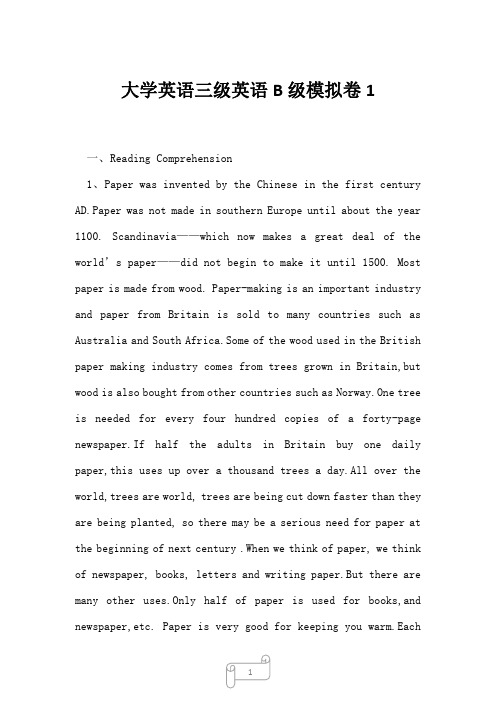
大学英语三级英语B级模拟卷1一、Reading Comprehension1、Paper was invented by the Chinese in the first century AD.Paper was not made in southern Europe until about the year 1100. Scandinavia——which now makes a great deal of the world’s paper——did not begin to make it until 1500. Most paper is made from wood. Paper-making is an important industry and paper from Britain is sold to many countries such as Australia and South Africa.Some of the wood used in the British paper making industry comes from trees grown in Britain,but wood is also bought from other countries such as Norway.One tree is needed for every four hundred copies of a forty-page newspaper.If half the adults in Britain buy one daily paper,this uses up over a thousand trees a day.All over the world,trees are world, trees are being cut down faster than they are being planted, so there may be a serious need for paper at the beginning of next century .When we think of paper, we think of newspaper, books, letters and writing paper.But there are many other uses.Only half of paper is used for books,and newspaper,etc. Paper is very good for keeping you warm.Eachyear,more and more things are made of paper. But the latest in paper making seems to be paper houses.Wher was paper invented?A. In ChinaB. In southern EuropeC. In ScandinaviaD. In Britain2、Scandinavia began to make paper__________.A.in 1100B.in 1400C.in 1500D.in the first century3、Every four hundred copies of a forty-paper newspaper will need _____________.A.half a treeB.one treeC.two treesD.more than one tree4、All over the world, trees are being cut down___________than they are being plantedA.more slowlyB.much fasterC.much more slowlyD.faster5、The latest things made of paper are___________.A.chairsB.tablesC.clothesD.houses二、Vocabulary and StructureIn this section there are 15incomplete sentences. For each sentence there are four choices marked A, B, C and D. Choose the ONE answer that best completes the sentence. Then mark the corresponding letter on the Answer Sheet with a single line through the center.1、The match was cancelled because most of the members __________ a match without a standard court.A.objected to havingB.objected to haveC.were objected to haveD.were objected to having2、Nowhere else in the world __________ more attractive scenery than in SwitzerlandA.you can findB.is foundC.can you findD.has been found3、This is a very difficult operation. It is essential that you __________ for emergency.A.are to be preparedB.would preparedC.be preparedD.must be prepared4、Most insurance agents would rather you __________ anything about collecting claims until they investigate the situation.A.don’t doB.didn’t doC.would not doD.do5、Her sun – tanned face suggested that she __________ in excellent healthA.beB.isC.wasD.were6、__________ evidence that language acquiring ability must be stimulatedA.It beingC.There isD.There being7、Having been asked to speak at the convention __________ .A.some notes were prepared for Dr. SmithB.Smith prepared some notesC.The convention members were pleased to hear Dr. SmithD.Some notes were prepared by Dr. Smith8、Ever since the Smiths moved to the suburbs a year ago they __________ better healthA.could have enjoyedB.had enjoyedC.have been enjoyingD.are enjoying9、People are spending more of their income on goods such as cars and household ________ .A.facilitiesB.appliancesC.instrumentsD.equipment10、Graceland, Elvis Presley’s former home, is now a tourist __________ that draws more than 600,000 visitors every year.B.attractionC.appointmentD.arrangement11、Food was in short __________ ; women stood in line for hours for a bucket of drinking water.A.storeB.provisionC.reserveD.supply12、Being the __________ sponsor of this competition, he has got great opportunities for advertising his products.A.principalB.chiefC.mainD.primary13、I don’t want to talk about it now. I’m not in the __________ .A.feelingB.attitudeC.emotionD.mood14、Latin America has an __________ labor force and natural resources.A.wealthyB.abundantC.scatteredD.deposited参考答案:【一、Reading Comprehension】1~5ACBD【二、Vocabulary and Structure】1~5ACCBC6~10CBCBB11~14点击下载查看答案。
大专英语b级模拟试题及答案
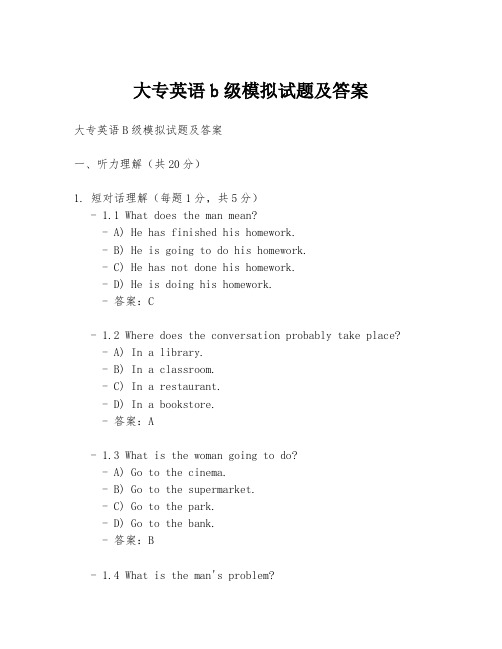
大专英语b级模拟试题及答案大专英语B级模拟试题及答案一、听力理解(共20分)1. 短对话理解(每题1分,共5分)- 1.1 What does the man mean?- A) He has finished his homework.- B) He is going to do his homework.- C) He has not done his homework.- D) He is doing his homework.- 答案:C- 1.2 Where does the conversation probably take place? - A) In a library.- B) In a classroom.- C) In a restaurant.- D) In a bookstore.- 答案:A- 1.3 What is the woman going to do?- A) Go to the cinema.- B) Go to the supermarket.- C) Go to the park.- D) Go to the bank.- 答案:B- 1.4 What is the man's problem?- A) He lost his wallet.- B) He forgot his password.- C) He can't find his keys.- D) He broke his phone.- 答案:A- 1.5 What is the weather like today?- A) Sunny.- B) Rainy.- C) Cloudy.- D) Snowy.- 答案:B2. 长对话理解(每题2分,共10分)- 2.1 What is the main topic of the conversation? - A) Travel plans.- B) Job interviews.- C) Hobbies.- D) Health issues.- 答案:A- 2.2 Why does the woman want to visit Paris?- A) To see the Eiffel Tower.- B) To attend a conference.- C) To meet a friend.- D) To study French.- 答案:A- 2.3 What does the man think about the trip?- A) It's too expensive.- B) It's too short.- C) It's too long.- D) It's too tiring.- 答案:B- 2.4 How does the woman feel about the trip?- A) Excited.- B) Bored.- C) Nervous.- D) Annoyed.- 答案:A- 2.5 What is the man's suggestion?- A) To take a train.- B) To take a bus.- C) To fly.- D) To drive.- 答案:C3. 短文理解(每题2分,共5分)- 3.1 What is the passage mainly about?- A) The benefits of exercise.- B) The importance of sleep.- C) The effects of stress.- D) The role of diet.- 答案:C- 3.2 What does the author suggest to reduce stress? - A) Listening to music.- B) Watching TV.- C) Taking a walk.- D) Eating chocolate.- 答案:C- 3.3 According to the passage, what is the effect of stress on the body?- A) It can cause headaches.- B) It can cause weight loss.- C) It can improve memory.- D) It can increase energy.- 答案:A- 3.4 What is the author's opinion on stress management? - A) It is essential for everyone.- B) It is only necessary for busy people.- C) It is not important at all.- D) It is only useful for athletes.- 答案:A- 3.5 What is the best title for the passage?- A) The Impact of Stress on Health.- B) The Importance of Regular Exercise.- C) The Benefits of a Healthy Diet.- D) The Role of Sleep in Daily Life.- 答案:A二、阅读理解(共30分)1. 选择题(每题2分,共20分)- 4.1 What is the main idea of the passage?- A) The importance of communication skills.- B) The role of technology in communication.- C) The challenges of effective communication.- D) The benefits of face-to-face communication. - 答案:C- 4.2。
高等学校英语应用能力考试B级模拟试卷1参考答案

PartⅠListening ComprehensionSection A1.A)2.C)3.D)4.D)5.C)Section B6.C)7.A)8.C)9.B)10.B)Section C11~15stood,advice,began,said,Count。
PartⅡStructureSection A16.C)17.A)18.D)19.B)20.D)21.A)22.C)23.B)24.B)25.A)Section B26.was playing。
27.would stop。
28.survivors。
29.to visit。
30.discussing。
31.repaired。
32.purify。
33.dangerous。
34.possibility。
35.clearer。
PartⅢReading ComprehensionTask136.A)37.C)38.B)39.D)40.C)41.C)42.B)43.A)44.B)45.A)Task346.St.Martin's College。
47.Saturday afternoon。
48.Monday23,September。
49.$120。
50.Conference organizer。
Task451.(B)日期邮戳(F)请转发52.(C)特快专递(O)免负邮资53.(H)挂号信(A)航空信54.(M)邮寄名单(P)邮资已付55.(J)电讯服务(G)邮政信箱Task556.Transformers。
57.The details。
58.technical specification。
59.More than10units。
60.pictures(of transformers)。
PartⅣTranslation(按四等评分:2-1.5-1-0分)61.D-C-B-A 62B-C-D-A 63.D-A-B-C 63B-A-C-A65.对我们有利的一种技术也可能有弊,认识到这一点很重要。
2023年大学英语三级英语B级模拟试题及答案3
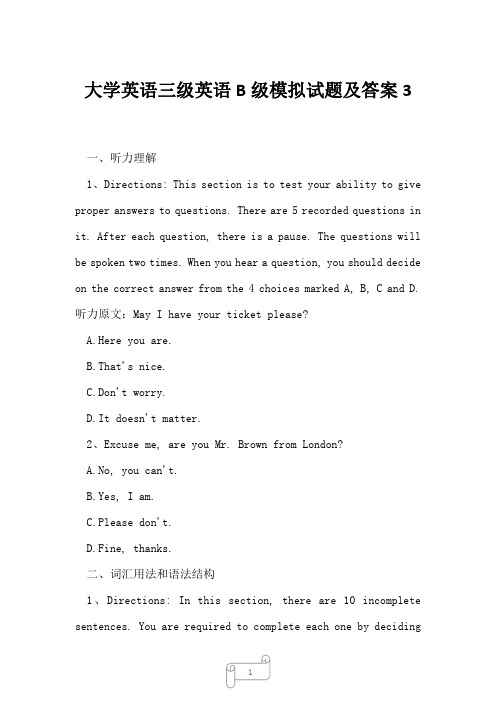
大学英语三级英语B级模拟试题及答案3一、听力理解1、Directions: This section is to test your ability to give proper answers to questions. There are 5 recorded questions in it. After each question, there is a pause. The questions will be spoken two times. When you hear a question, you should decide on the correct answer from the 4 choices marked A, B, C and D.听力原文:May I have your ticket please?A.Here you are.B.That's nice.C.Don't worry.D.It doesn't matter.2、Excuse me, are you Mr. Brown from London?A.No, you can't.B.Yes, I am.C.Please don't.D.Fine, thanks.二、词汇用法和语法结构1、Directions: In this section, there are 10 incomplete sentences. You are required to complete each one by decidingon the most appropriate word or words from the 4 choices marked A , B, C, and D.To______the truth, I really didn"t know anything about yesterday"s meeting.A.doB.tellC.putD.take2、Your sales methods will depend______the customers with whom you deal.A.withB.onC.inD.for3、(general)______speaking, table manners vary from culture to culture.4、 The wallpaper pattern (design)______by a famous Chinese artist several years ago.三、阅读理解1、Directions: After reading the following passage, you will find 5 questions or unfinished statements, numbered 36 through 40. For each question or statement there are 4 choices marked A, B, C, and D. You should make the correct choice.Thank youfor your interest in Calibre Cassette library. This letter tells you about our service. With it we are sending you an application form, so that you can join if you would like to try it. Calibre library aims to provide the pleasure of reading to anyone who cannot read ordinary printed books because of sight problems. We currently have over 7,000 books available for reading for pleasure, including 1,000 specially for children. All our books are recorded cover-to-cover on ordinary cassettes and can be played on any cassette players. They are sent and returned by post, free of charge. When we receive your application, we will send you a book and an information tape. They will explain how to use the service. The easy way to use Calibre library is to tell us what sorts of books you like, and we will keep you supplied with books we think you will enjoy. Or you can send us a list of books you would like to read, and we will then send you books from this list whenever possible. In that case you will need to use our website, or buy one or more of our catalogues(名目).According to the first paragraph, the library sends the application form. to the readers so that they canA.read ordinary booksB.order cassette playersC.buy Calibre cassettese the library service2、Calibre library provides service mainly for people who suffer from______.A.hearing difficultiesB.mental illnessesC.sight problemsD.heart troubles四、翻译(英译汉)1、With fuel prices going up,car buyers are changing their idea of buying a car.A.燃料的价格正在随着购车者买车想法的转变而上涨。
英语b级模拟试题及答案
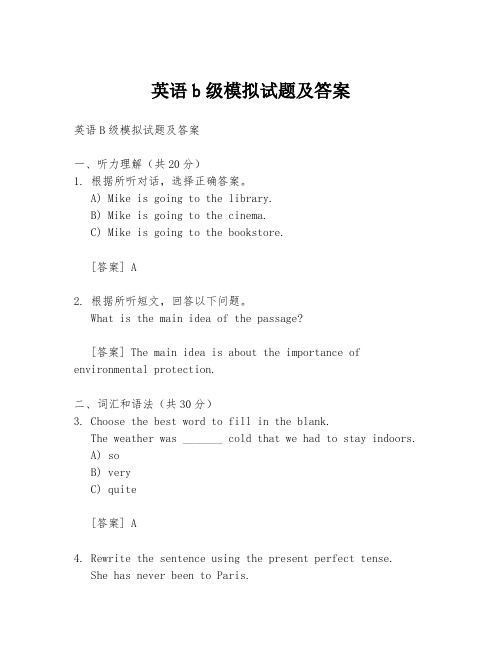
英语b级模拟试题及答案英语B级模拟试题及答案一、听力理解(共20分)1. 根据所听对话,选择正确答案。
A) Mike is going to the library.B) Mike is going to the cinema.C) Mike is going to the bookstore.[答案] A2. 根据所听短文,回答以下问题。
What is the main idea of the passage?[答案] The main idea is about the importance of environmental protection.二、词汇和语法(共30分)3. Choose the best word to fill in the blank.The weather was _______ cold that we had to stay indoors.A) soB) veryC) quite[答案] A4. Rewrite the sentence using the present perfect tense.She has never been to Paris.[答案] She has never visited Paris.三、阅读理解(共30分)5. Read the following passage and answer the questions.Passage: [A passage about the history of the internet.]a) When was the internet first developed?b) What was the main purpose of the internet initially?[答案]a) The internet was first developed in the late 1960s.b) The main purpose was to share information between computers.6. Read the text and choose the correct answer.What does the author think about the future of AI?A) It will replace human workers.B) It will enhance human capabilities.C) It will lead to unemployment.[答案] B四、完形填空(共10分)7. Fill in the blanks with the appropriate words.The young man was _______ to find his lost dog.A) surprisedB) disappointedC) excited[答案] C8. Choose the best phrase to complete the sentence.The company is _______ to expand its business overseas.A) eagerB) reluctantC) indifferent[答案] A五、翻译(共10分)9. Translate the following sentence into English.他决定放弃这份工作,因为他找到了一个更好的机会。
英语b级考试试题及答案
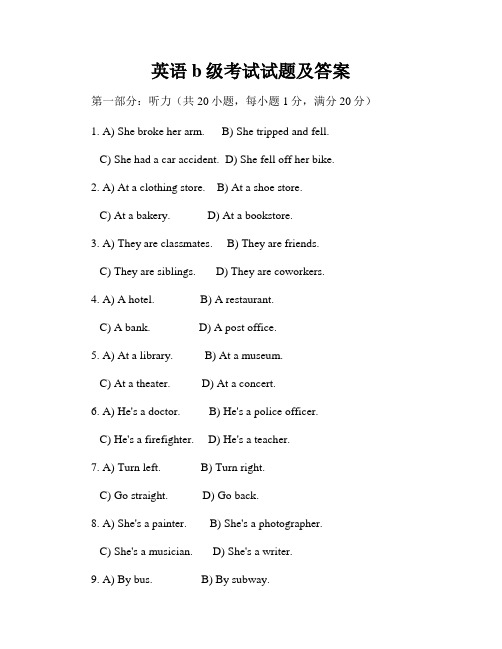
英语b级考试试题及答案
第一部分:听力(共20小题,每小题1分,满分20分)
1. A) She broke her arm. B) She tripped and fell.
C) She had a car accident. D) She fell off her bike.
2. A) At a clothing store. B) At a shoe store.
C) At a bakery. D) At a bookstore.
3. A) They are classmates. B) They are friends.
C) They are siblings. D) They are coworkers.
4. A) A hotel. B) A restaurant.
C) In the evening. D) At night.
15. A) In a hotel. B) In a restaurant.
C) In a hospital. D) In an office.
16. A) It's sunny. B) It's cloudy.
C) It's raining. D) It's snowing.
- 1、下载文档前请自行甄别文档内容的完整性,平台不提供额外的编辑、内容补充、找答案等附加服务。
- 2、"仅部分预览"的文档,不可在线预览部分如存在完整性等问题,可反馈申请退款(可完整预览的文档不适用该条件!)。
- 3、如文档侵犯您的权益,请联系客服反馈,我们会尽快为您处理(人工客服工作时间:9:00-18:30)。
大学英语B级模拟试题第套————————————————————————————————作者:————————————————————————————————日期:大学英语(B)模拟试卷Test 3第一部分:交际用语(共5小题;每小题3分,满分15分)此部分共有5个未完成的对话,针对每个对话中未完成的部分有4个选项,请从A、B、C、D 4个选项中选出正确选项。
1. —Hi, Bob, how‘s everything with you?—__________, and how are you?A. Don’t mention itB. Hm, not too bad.C. ThanksD. Pretty fast2. —Who is that speaking?—This is Wang Li__________.A. speaksB. spokenC. speakingD. saying3. —Could you help me with my chemistry, please?—______________________A. No, no way.B. No, I couldn’t.C. No, I can’t.D .Sorry I can’t. I have to go to a meeting right now.4. —Can you go to the movie with us this evening?—______________________A. No, I already have plans.B. I’d love to, but I’m busy tonight.C. No, I really don’t like being with you.D. I’m ill, so I shouldn’t go out.5. —Hey, Kate, what’s up?—______________________A. Yes, definitely!B. Oh, not much.C. What is happening in your life?D. You are lucky.第二部分:阅读理解(共10小题;每小题3分,满分30分)此部分共有2篇短文,在第一篇短文后有5个正误判断题,从每题后的2个选项中选出正确答案;在第2篇短文后有5个问题。
请从每个问题后的A、B、C、D 4个选项中选出正确选项。
Passage 1Places to stay in Britain are as varied as the places you visit. Whatever your budget is the choice -from basic barn to small hotel, from tiny cottage to grand castle - is all part of fun.HostelsCheap, good? -value hostels are aimed at all types of like-minded travelers, who prefer valueover luxury and you don’t have to be young or single to use them. Britain’s independent hostels and backpackers hostels also offer a great welcome. Facilities and prices vary, especially in rural areas, where some hostels are a little more than a bunkhouse (临时住房) while others are remarkably comfortable -almost like bargain hotels.Youth HotelsFounded many years ago to “help all, especially young people of limited means, to a greater knowledge, lo ve and care of the countryside”, the Youth Hotels Association is still going strong in the 21st century. The network of 230 hotels is a perfect gateway for exploring Britain’s towns and countryside.B&BsThe B&B (bed and breakfast) is a Great British institution. In essence you get a room in somebody’s house, and small B&Bs may only have one guest room, so you’ll really feel like part of the family. Larger B&Bs may have four or five rooms and more facilities, but just as warm as a welcome. In country areas your B&B might be in a village or an isolated farm surrounded by fields. Prices reflect facilities, and usually run from around £12 to £20 per person. City B&Bs charge about £25 to £30 per person, although they’re often cheaper as you go further out to t he suburbs.Pubs & InnsAs well as selling drinks and meals, Britain’s pubs and inns sometimes offer B&B, particularly in country areas. Staying a night or two can be great fun and puts you at the heart of the local community. Rates range from around £15 to £25 per person. Pubs are more likely to have single rooms.()6. In this passage the author mainly tells us where to stay while visiting Britain.A. TB. F()7. Pubs & Inns are mainly built for young visitors.A. TB. F()8. If you travel alone and want to know better about family life in Britain, you’d better stay in B&Bs.A. TB. F()9. If you are interested in travelling with your friends but only with limited mean s, you’d better stay in Hostels.A. TB. F()10. All pubs and inns offer visitors bed and breakfast.A. TB. FPassage 2America is growing older. Fifty years ago, only 4 out of every 100 people in the United States were 65 or older. Today, 10 out of every 100 Americans are over 65. The aging of the population will affect American society in many ways —education, medicine, and business. Quietly the graying of America has made us a very different society — one in which people have a quite different idea of what kind of behavior is suitable at various ages.A person’s age no longer tells you anything about his/her social position, marriage or health. There’s no longer a particular year in which one goes to school or goes to work or gets married orstarts a family. The social clock that kept us on time and told us when to go to school, get a job, or stop working isn’t as strong as it used to be. It doesn’t surprise us to hear of a 29-year-old university president or a 35-year-old grandmother, or a 70-year-old man who has become a father for the first time. Public notions are changing.Many people say, “I am much younger than my mother — or my father —was at my age.” No one says “act your age” anymore. We’ve stopped looking with surprise at older people who act in youthful ways.11. It can be learnt from the text that the aging of the population in America ______________A. has made people feel younger.B. has changed people’s social pos ition.C. has changed people’s understanding of age.D. has slowed down the country’s social development.12. The underlined word “one” refers to ______________.A. a societyB. AmericaC. a placeD. population13. We can infer from the text that if a 25-year-old man becomes general manager of a big firm,the writer would most probably consider it ______________.A. normalB. wonderfulC. unbelievableD. unreasonable14. “Act your age” means people should ______________A. be active when they are old.B. do the right thing at the right age.C. show respect for their parents young or old.D. take more physical exercise suitable to their age.15. This passage is mainly about ______________A. why American society is different.B. sui table behaviors at different age in American’s eyes.C. how older people act in youthful ways in America.D. how American people’s ideas about age have changed.第三部分:词汇与结构(共5小题;每小题2分,满分10分)此部分共有5个未完成的句子,针对每个句子中未完成的部分有4个选项,请从A、B、C、D 4个选项中选出正确选项。
